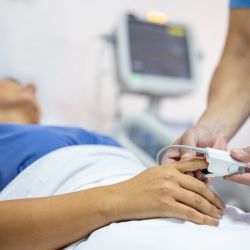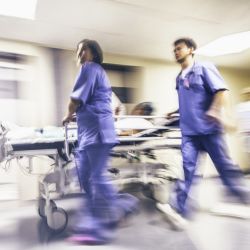In a world first, a completely robotic surgery and anaesthesia has been performed at the McGill University Health Centre (MUHC). The DaVinci surgical robot, which lets surgeons work from remote locations, was put to work this summer, whereas the anaesthesia robot, nicknamed McSleepy, has been providing automated anaesthesia since 2008. The two combined to perform the first all-robotic surgery on a prostatectomy patient at the Montreal General Hospital.
“Collaboration between DaVinci, a surgical robot, and anaesthetic robot McSleepy, seemed an obvious fit; robots in medicine can provide health care of higher safety and precision, thus ultimately improving outcomes,” said Dr. TM Hemmerling of McGill University and MUHC’s Department of Anaesthesia, who is also a neuroscience researcher at the Research Institute (RI) of the MUHC.
“The DaVinci allows us to work from a workstation operating surgical instruments with delicate movements of our fingers with a precision that cannot be provided by humans alone,” said Dr. A. Aprikian, MUHC urologist in chief and Director of the MUHC Cancer Care Mission, and also a researcher in the Cancer Axis at the RI MUHC. He and his team of surgeons operate the robotic arms from a dedicated workstation via video control with unsurpassed 3D HD image quality.
“Providing anaesthesia for robotic prostatectomy can be challenging because of the specific patient positioning and the high degree of muscle relaxation necessary to maintain perfect conditions for the surgical team,” added Dr. Hemmerling. “Automated anaesthesia delivery via McSleepy guarantees the same high quality of care every time it is used, independent from the subjective level of expertise. It can be configured exactly to the specific needs of different surgeries, such as robotic surgery.”
“Obviously, there is still some work needed to perfect the all robotic approach – from technical aspects to space requirements for the robots,” added Dr. Hemmerling. “Whereas robots have been used in surgery for quite some time, anaesthesia has finally caught up. Robots will not replace doctors but help them to perform to the highest standards.”
Combining both robots, the specialists at the MUHC can deliver the most modern and accurate patient care. The researchers will use the results of this project to test all robotic surgery and anaesthesia in a larger scale of patients and various types of surgery. ”This should allow for faster, safer and more precise surgery for our patients” concluded Dr. Aprikian.
|
Story Source:
The above story is reprinted (with editorial adaptations by ScienceDaily staff) from materials provided by McGill University Health Centre.























